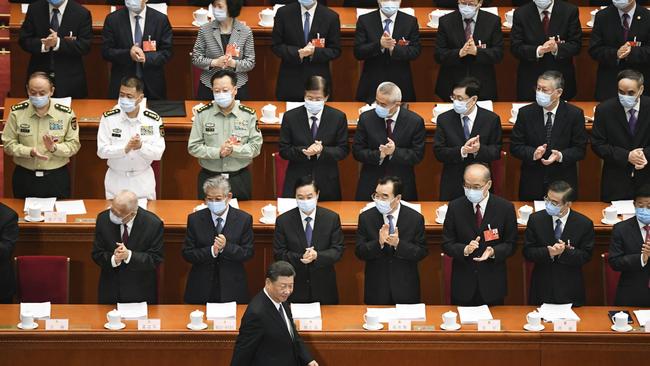Coronavirus: China abandons growth forecast, threatens Hong Kong crackdown
China’s leaders concede they face ‘challenges like never before’ as key 2020 target is canned.

China has abandoned an economic growth target for 2020, as the country’s leaders concede they face “challenges like never before” and their advisers warn of a “second wave” of the coronavirus.
Premier Li Keqiang revealed the news — a remarkable development in China’s highly centralised political system — while delivering the Work Report, a state-of-the-nation document, which also confirmed a controversial plan to impose Beijing’s hardline security apparatus on Hong Kong.
“We have not set a specific target for economic growth this year. This is because our country will face some factors that are difficult to predict,” Mr Li said in the Great Hall of the People in front of the elite of the ruling Chinese Communist Party in Beijing.
The lack of a growth target and the Hong Kong clampdown — which is predicted to inflame the city’s pro-democracy protests — shows Australia’s biggest trading partner is struggling to negotiate the COVID-19 economic disruption while also attempting to seize strategic opportunities.
Peking University economics professor Yao Yang said the lack of a target would “allow more room for macroeconomic policy” and would leave the government in a better position to respond to further economic deterioration.
“We have to be prepared for a second wave of the coronavirus,” Professor Yao told The Weekend Australian.
It is the first time Beijing has omitted a growth target since it began the practice in 1994, and it comes after China reported a 6.1 per cent gain in GDP last year, its slowest pace since its international relations were imperilled after the Tiananmen Square crackdown in 1989.
In the first quarter of 2020, its economy shrunk by 6.8 per cent from a year earlier, the first contraction in more than four decades.
While the Work Report contains a commitment to create nine million new jobs this year, its COVID-19 stimulus measures were modest by global standards.
Despite the economic slowdown, China’s defence spending increased by 6.6 per cent, although that is down from double-digit increases that have given the country the second-biggest defence budget in the world behind the US.
The People’s Liberation Army, the ruling Communist Party’s military wing, is the world’s largest standing army, and in recent years it has added aircraft carriers, nuclear-powered submarines and stealth fighters to its arsenal, most of them produced domestically.
Mr Li delivered the Work Report — which he read out in full in an hour, its briefest iteration for decades — on the first day of the National People’s Congress, the biggest political gathering in the Chinese governing system.
While the speech revealed the pragmatism of China’s ruling party on economic affairs, it was also woven with the reverence for Chinese President Xi Jinping that has intensified since he took over as General Secretary in 2012.
Mr Li repeated six times that China was led by the Central Communist Party “with Comrade Xi Jinping at its core”.
On another three occasions, Mr Li said the world’s second-biggest economy was following the “guidance of Xi Jinping Thought on Socialism with Chinese Characteristics for a New Era”, including in its “People’s War” against COVID-19. “General Secretary Xi Jinping has … personally taken charge and planned our response,” he said, while noting the country’s ongoing international challenges.
“China will face challenges like never before,” Mr Li said.
The hardline of the Xi era was also on show. Mr Li said China had “made major strategic achievements in our response to COVID-19” and confirmed Beijing’s intention to further its control over its special administrative region of Hong Kong.
“We will establish sound legal systems and enforcement mechanisms for safeguarding national security,” Mr Li said, even as Hong Kong chief executive Carrie Lam listened on stage.
Before the speech, Beijing revealed it would effectively bypass Hong Kong’s legislative process.
A draft of the legislation circulated among delegates on Friday said Beijing would impose its national security apparatus on Hong Kong to stop subversive activity.
“This is the end of Hong Kong,” said pro-democracy Hong Kong legislator Dennis Kwok. And some analysts predicted a violent reaction in Hong Kong, as Washington condemned the change.
“If it happens, we’ll address that issue very strongly,” US President Donald Trump responded.
While the US was mentioned only once — in relation to the US-China trade deal, which Mr Trump has threatened to abandon — the dire state of the bilateral relationship loomed over the meeting.
Just hours before the Beijing gathering, Mr Trump attacked Mr Xi and his leadership group for their handling of the coronavirus.
“It all comes from the top. They could have easily stopped the plague, but they didn’t,” the President wrote on Twitter.
The National People’s Congress, which was delayed by almost three months because of the pandemic, began with a moment of silence to mark the more than 4000 Chinese citizens who have died from the coronavirus.
The 2897 delegates all wore face masks, except for the members of the Communist Party’s politburo, led by Mr Xi, who was seated on the stage.








To join the conversation, please log in. Don't have an account? Register
Join the conversation, you are commenting as Logout